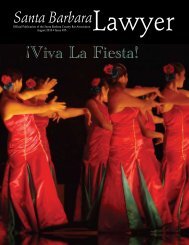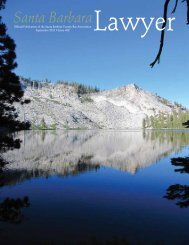Santa Barbara Lawyer - Santa Barbara County Bar Association
Santa Barbara Lawyer - Santa Barbara County Bar Association
Santa Barbara Lawyer - Santa Barbara County Bar Association
You also want an ePaper? Increase the reach of your titles
YUMPU automatically turns print PDFs into web optimized ePapers that Google loves.
The Practice of Law<br />
How to Annoy the<br />
Court of Appeal in 4<br />
Easy steps<br />
By Jo h n de r r i C k<br />
S<br />
tep 1: The guru of legal writing is someone called<br />
Bryan Garner. He edits Black’s Law Dictionary. He<br />
also presents legal writing seminars nationwide.<br />
(www.lawprose.org.)<br />
I’ve never been to one, although I’ve heard great things<br />
about them. But Garner gives out one piece of advice that’s<br />
really bad. It’s number-one on my list of how<br />
to annoy the Court of Appeal.<br />
The advice: “Put your case citations in<br />
footnotes.” According to Garner, citations<br />
mid-paragraph disturb the flow of prose and<br />
distract the reader.<br />
The flaw in Garner’s advice is that some<br />
people actually want to read the citations.<br />
The source and nature of authority may be of<br />
more than mere passing interest. And there’s<br />
nothing more giddy-making to the legal reader than making<br />
one’s eyes go up and down the page between text and footnotes,<br />
like someone watching a tennis game on paper.<br />
No doubt there may be some Justice or research attorney<br />
buried in the California appellate system who favors this.<br />
But I have heard scathing comments on the Garner footnote<br />
idea from members of the appellate bench at MCLE<br />
events.<br />
Step 2: How about refusing to stipulate to extensions<br />
of up to 60 days for principal briefs? As a practical matter,<br />
the Court of Appeal virtually always grants applications for<br />
such extensions — usually in two lots of 30 — if there is a<br />
vaguely plausible request. But stipulations save the Clerk’s<br />
Office time. Ones of up to 60 days are effective on filing<br />
and don’t require a Court order. (I’m talking about state<br />
court. The Feds do things differently.)<br />
<strong>Lawyer</strong>s who don’t stipulate to extensions are making<br />
work for every one. And they’re probably making life difficult<br />
for themselves, because the chances are they, too,<br />
will need an extension.<br />
I know that clients sometimes don’t like it if their lawyer<br />
agrees to extensions. But this is an instance of where the<br />
lawyer should call the shots. I make it clear in my fee agree-<br />
And this guy droned<br />
on, seemingly oblivious<br />
to the irritation he was<br />
causing. Eventually, he<br />
was cut off.<br />
ments that I may enter into<br />
60-day stipulations.<br />
Step 3: Oral argument<br />
presents plenty of opportunities<br />
to annoy. Both<br />
sides are entitled to up to<br />
30 minutes. But except<br />
in rare cases, you’ll make<br />
yourself very unpopular<br />
if you insist on your full<br />
allocation. Fifteen minutes<br />
is generally a reasonable<br />
maximum — 5-12 minutes<br />
usually suffice.<br />
Probably the worst oral<br />
argument I’ve ever seen<br />
was at Division Six in<br />
12 <strong>Santa</strong> <strong><strong>Bar</strong>bara</strong> <strong>Lawyer</strong><br />
John Derrick<br />
Ventura about a year ago. I was defending<br />
an appeal. It wasn’t a complex case. The appellant<br />
was funded by an insurance carrier,<br />
and the law firm seemed determined to milk<br />
the file.<br />
For a start, it sent two lawyers to oral argument.<br />
Both sat at the counsel table — and, no<br />
doubt, billed — although only one argued.<br />
He had put in a 30-minute estimate. And he<br />
literally started to read out long paragraphs<br />
from cases.<br />
Since arguments are called in order of time estimates, with<br />
the shortest first, we were stuck at the end of the morning<br />
calendar (resulting in both of those lawyers being able to bill<br />
to the max). It had actually gone past the noon hour. People<br />
wanted to go to lunch. And this guy droned on, seemingly<br />
oblivious to the irritation he was causing. Eventually, he was<br />
cut off. Surprisingly, he was a certified appellate specialist<br />
(not, I hasten to add, from <strong>Santa</strong> <strong><strong>Bar</strong>bara</strong>).<br />
Step 4: One often sees lawyers arriving for oral argument<br />
lugging piles of banker’s boxes containing the record. As<br />
though they’ll have an opportunity to do anything with it<br />
in the short span of their argument.<br />
But that’s their problem. What is annoying is when the<br />
record ends up much bulkier than it need be. All too often,<br />
lawyers put virtually the whole Superior Court file into<br />
a multi-volume Appendix or Clerk’s Transcript, but then<br />
cite to only a fraction of what’s there. Don’t bloat records<br />
(unless you want to annoy). Someone at the receiving end<br />
has to handle all that stuff.<br />
John Derrick is certified by The State <strong>Bar</strong> of California Board of<br />
Legal Specialization as a Specialist in Appellate Law.





